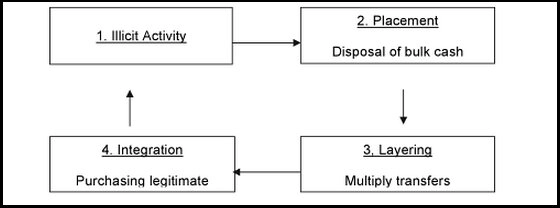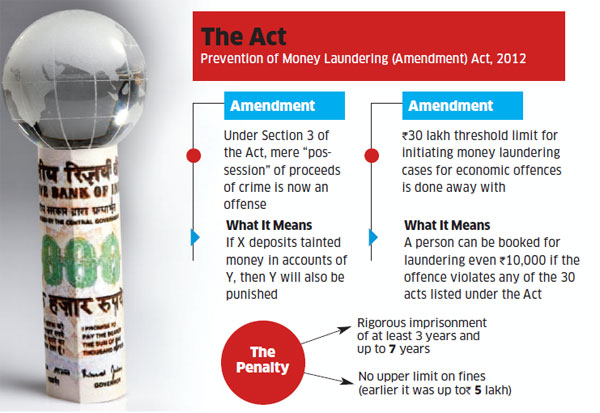Indian Economy
Misuse of Prevention of Money Laundering Act
- 14 Feb 2022
- 6 min read
For Prelims: Supreme Court, Money Laundering, Prevention of Money Laundering Act, Enforcement Directorate, Enforcement Case Information Report, Foreign Exchange Management Act.
For Mains: Money Laundering, Challenges to Internal Security Through Communication Networks, Significance and issues with the Prevention of Money Laundering Act 2002 (PMLA), Foreign Exchange Management Act.
Why in News
The Supreme Court (SC) is examining allegations of rampant misuse of Prevention of Money Laundering Act 2002 (PMLA) by the government and the Enforcement Directorate (ED).
What are the Major Allegations?
- Being Used for Ordinary Crimes:
- PMLA is pulled into the investigation of even “ordinary” crimes and assets of genuine victims have been attached.
- PMLA was enacted in response to India’s global commitment (including the Vienna Convention) to combat the menace of money laundering. Instead, rights have been “cribbed, cabined and confined”.
- PMLA was a comprehensive penal statute to counter the threat of money laundering, specifically stemming from trade in narcotics.
- Currently, the offences in the schedule of the Act are extremely overbroad, and in several cases, have absolutely no relation to either narcotics or organised crime.
- Lack of Transparency and Clarity:
- Even the Enforcement Case Information Report (ECIR) - an equivalent of the FIR - is considered an “internal document” and not given to the accused.
- The ED treats itself as an exception to these principles and practises [of criminal procedure law] and chooses to register an ECIR on its own whims and fancies on its own file.
- There is also a lack of clarity about ED’s selection of cases to investigate. The initiation of an investigation by the ED has consequences which have the potential of curtailing the liberty of an individual.
- Even the Enforcement Case Information Report (ECIR) - an equivalent of the FIR - is considered an “internal document” and not given to the accused.
What is the Prevention of Money Laundering Act?
- It forms the core of the legal framework put in place by India to combat Money Laundering.
- The provisions of this act are applicable to all financial institutions, banks (Including RBI), mutual funds, insurance companies, and their financial intermediaries.
- PMLA (Amendment) Act, 2012:
- Adds the concept of ‘reporting entity’ which would include a banking company, financial institution, intermediary etc.
- PMLA, 2002 levied a fine up to Rs 5 lakh, but the amendment act has removed this upper limit.
- It has provided for provisional attachment and confiscation of property of any person involved in such activities.
What is Money Laundering?
- About:
- Money laundering is the process of making large amounts of money generated by criminal activity, such as drug trafficking or terrorist funding, appear to have come from a legitimate source.
- Criminal activities like illegal arms sales, smuggling, drug trafficking and prostitution rings, insider trading, bribery and computer fraud schemes produce large profits.
- Thereby it creates the incentive for money launderers to "legitimise" the ill-gotten gains through money laundering.
- The money generated is called 'dirty money' and money laundering is the process of conversion of 'dirty money', to make it appear as 'legitimate' money.
- Process of Money Laundering:
- Money laundering is a three-stage process :
- Placement: The first stage is when the crime money is injected into the formal financial system.
- Layering: In the second stage, money injected into the system is layered and spread over various transactions with a view to obfuscate the tainted origin of the money.
- Integration: In the third and the final stage, money enters the financial system in such a way that original association with the crime is sought to be wiped out and the money can then be used by the offender as clean money.

- Some of the Common Methods of Money Laundering:
- Bulk Cash Smuggling, Cash Intensive Businesses, Trade-based laundering, Shell companies and trusts, Round-tripping, Bank Capture, Gambling, Real Estate, Black Salaries, Fictional Loans, Hawala, False invoicing.
- Money laundering is a three-stage process :
What is the Enforcement Directorate?
- Directorate of Enforcement is a specialised financial investigation agency under the Department of Revenue, Ministry of Finance..
- On 1st May 1956, an ‘Enforcement Unit’ was formed, in the Department of Economic Affairs, for handling Exchange Control Laws violations under Foreign Exchange Regulation Act, 1947.
- In the year 1957, this Unit was renamed as ‘Enforcement Directorate’.
- ED enforces the following laws:
- Foreign Exchange Management Act,1999 (FEMA)
- Prevention of Money Laundering Act, 2002 (PMLA)







